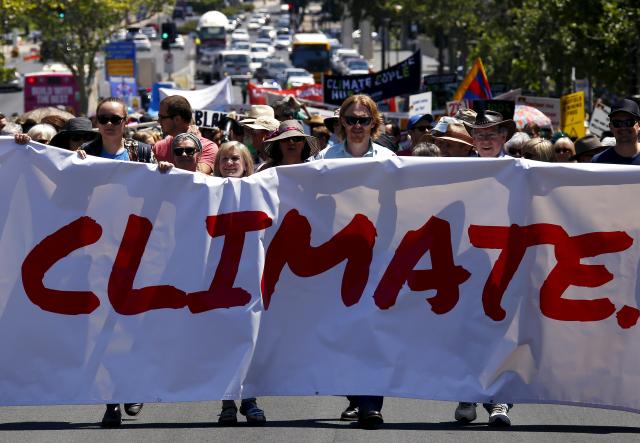SYDNEY (Reuters) – Australia’s revolving door of political leadership has hit confidence in sectors particularly prone to policy uncertainty, such as energy, which could hurt business investment and push back the timeframe for a central bank interest rate hike.
The resource-rich economy has seen five changes of prime minister over the past decade with Malcolm Turnbull last week becoming the latest to lose the top job amid political upheaval.
Growth has mostly remained unscathed – Australia has posted 27 years of uninterrupted expansion – but 10 years of political deadlock over climate and clean energy policies, among others, have created headaches for pockets of the economy.
Divall’s Earthmoving and Bulk Haulage, which employs 250 people, has drawn business from wind farm developments northeast of the capital city Canberra but is considering scaling down operations due to political risks.
“Because of the policy failure in Canberra, some of the wind farms we work for are now sitting on the fence and that is hurting us,” Andrew Divall, the firm’s founder, told Reuters.
He is particularly nervous about policy direction under new Energy Minister Angus Taylor, who has long campaigned against wind farms and earlier this month called the obsession with emissions “a massive mistake.”
Climate and energy politics have long been problematic for Australia’s leaders.
Turnbull, whose views on climate change put him at odds with skeptics in his own Liberal party, last week was forced to water down a long-awaited energy policy in a failed bid to stave off a challenge to his leadership.
Several Liberal party members, including former Treasurer Joe Hockey and ex-Prime Minister Tony Abbott have in the past publicly bemoaned wind farm aesthetics, calling them “appalling”,” ugly”, “noisy” or “visually awful.”
Neither of them have supported other forms of renewable energy either. Turnbull cited such “bitterly entrenched views” in his farewell speech last week as a reason for the political deadlock.
Research group BIS Oxford estimates electricity engineering works to slump more than 27 percent to A$8 billion over the next five years with fewer projects in the pipeline and as the “current energy policy failures deter new investment.”
Also weighing on confidence is the prospect of a federal election, which needs to be held by May next year and could effect yet another change of prime minister with the opposition Labor party currently ahead in the polls.
Amid the policy limbo and risks already hitting the housing market, some economists expect the central bank to keep rates at a record low 1.50 percent beyond 2020 to help support the A$1.8 trillion economy.
Westpac chief economist Bill Evans last week cited the political environment as one of the reasons for the Reserve Bank of Australia to stay pat until the end of 2020, as it revised its forecasts.
Evans expects the uncertainty to weigh on business confidence, spending and employment plans which in-turn would hurt an already cautious consumer.
“DISAPPOINTING AND HUGELY FRUSTRATING”
The absence of a stable carbon policy over the past decade has resulted in underinvestment in energy generation, which has led to soaring power prices. That has, in-turn, hurt energy-intensive manufacturers such as aluminum, steel and packaging makers.
Alinta Energy, now owned by Hong Kong’s Chow Tai Fook Enterprises, was forced in 2016 to shut a coal-fired plant in South Australia because it had become unprofitable.
Building products maker Brickworks has repeatedly said soaring energy prices were piling on cost pressures and stifling business investment, while gas pipeline company APA last week lambasted politicians for causing the instability in Canberra.
“It’s disappointing and hugely frustrating for me to see our elected leaders putting their election agendas ahead of the best interests of the country,” APA Managing Director Mick McCormack told Reuters in an interview.
CONTINENT OF INSTABILITY
Australia has not had a prime minister complete a full three-year term since 2007, a stark comparison to some less developed economies in the region.
Ironically, Papua New Guinea, once considered a part of the politically volatile chain of island nations to Australia’s north known as the “arc of instability”, has had the same prime minister since 2011.
Oil Search boss Peter Botten expressed relief that most of the company’s oil and gas operations were in Papua New Guinea, not Australia.
“I’m actually glad that I work primarily in Papua New Guinea, where the fiscal regime and policy settings seem to be substantially more stable on key areas of energy development than in Australia,” Botten told reporters.





